Introduction
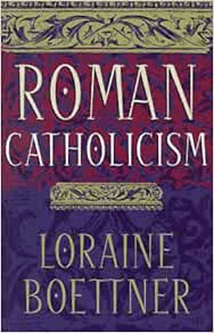 Loraine Boettner in his 1962 book Roman Catholicism states on page 117:
Loraine Boettner in his 1962 book Roman Catholicism states on page 117:
The remarkable thing, however, about Peter’s alleged bishopric in Rome is that the New Testament has not one word to say about it. The word Rome occurs only nine times in the Bible [actually, ten times in the Old Testament and ten times in the New], and never is Peter mentioned in connection with it. There is no allusion to Rome in either of his epistles. Paul’s journey to the city is recorded in great detail (Acts 27 and 28). There is in fact no New Testament evidence, nor any historical proof of any kind, that Peter ever was in Rome. All rests on legend.
Associate Professor in the Department of Religious Studies at Brown University thinks he never did go to Rome as well. This is what she wrote:
The absence of connection between Peter and Rome in the New Testament, the lack of reference to him in our earliest Roman Christian literature, and what we know of Peter’s background and character all combine to make it unlikely, to my mind, that he never went to Rome.[1]
If this is true, then the Roman Catholic church has a problem because the papacy is based on the assumption that Peter was the first bishop of Rome and that his successors become popes.
By way of clarification, the term papacy denotes the ecclesiastical system in which the pope as successor of St. Peter and Vicar of Jesus Christ governs the Catholic Church as its supreme head.[2]
So, did Peter travel to Rome and conclude his ministry there?
As has been stated above, the New Testament is silent on this question as it is with the travels of all the disciples with the exceptions of Paul and possibly John (Revelation 1:9), but Peter certainly did travel.
Peter appears to have preached in Pontus, Galatia, Bithynia, Cappadocia, and Asia to the Jews of the dispersion because these are the people to whom he directed his first letter (1 Peter 1:1). The apostle Paul wanted to preach in Bithynia, but the Spirit of Jesus would not allow them (Paul and associates) to go (Acts 16:7). This is, of course, the same area of Asia to which Peter directed his first letter. A logical reason for Paul’s prevention is that Peter would preach there, and if so, he did travel great distances.
He certainly journeyed to Caesarea where the Roman centurion Cornelius was waiting for him and through the agency of Peter, placed his faith in the Lord Jesus Christ (Acts 10). Sometime later, Peter traveled to Antioch where Paul confronted him about not associating himself with Gentiles (Galatians 2:11-14).
So, the only evidence with have as to whether Peter did go to Rome, must come from the writings of early Christians and the following is what they had to say.
Evidence from the early church fathers that Peter was in Rome and as well, Mark wrote his gospel by listening to Peter preach.
Mark is not mentioned in his gospel as having any eyewitness account, so how did he get his information regarding the ministry of Jesus? When Paul was imprisoned in Rome, he summoned Timothy to bring Mark with him when he, Timothy, visited (2 Timothy 4:11). This certainly provided a way for Mark to get to Rome and the following extracts from the writings of the early church fathers confirm that Mark wrote his gospel from listening to Peter and that it all took place in Rome.
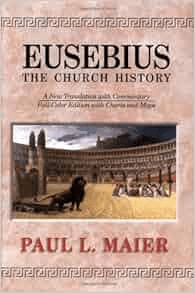 Eusebius (AD 260-339) was the bishop in Caesarea and the first Christian historian. He fills in the time from when the New Testament ended to the time of Constantine I under whose direction Christianity became the state religion.
Eusebius (AD 260-339) was the bishop in Caesarea and the first Christian historian. He fills in the time from when the New Testament ended to the time of Constantine I under whose direction Christianity became the state religion.
In his book, Eusebius The Church History, Dr Paul L Maier presents a word for word translation of Eusebius’s Church History, he makes the following comment: It is most fortunate that Eusebius quotes his sources extensively, since many of them have been lost and would not have survived, even in fragments had Eusebius not incorporated them into his history.
Papias (AD 60- about 130) was an early Christian writer and bishop of Hierapolis, in Phrygia (now in Turkey), and one of the Apostolic Fathers. His work Explanation of the Sayings of the Lord provides important apostolic oral source accounts of the history of early Christianity and of the origins of the Gospels. Although his writings have been lost, Eusebius records him as stating in relation to Mark,
Mark became Peter’s interpreter and wrote down accurately, but not in order, all that he remembered of the things said and done by the Lord. For he had not heard the Lord or been one of his followers, but later, as I said, a follower of Peter. Peter used to teach as the occasion demanded, without giving systematic arrangement to the Lord’s sayings, so that Mark did not err in writing down some things just as he recalled them. For he had one overriding purpose: to omit nothing that he had heard and to make no false statements on his account.
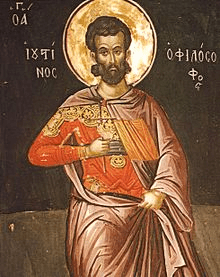 Early Christian apologist, Justin Martyr, wrote Dialogue with Trypho (approximately AD 150) [the image is a fifteenth century icon] and included this interesting passage:
Early Christian apologist, Justin Martyr, wrote Dialogue with Trypho (approximately AD 150) [the image is a fifteenth century icon] and included this interesting passage:
It is said that he [Jesus] changed the name of one of the apostles to Peter; and it is written in his memoirs that he changed the names of others, two brothers, the sons of Zebedee, to Boanerges, which means ‘sons of thunder’….
Justin, therefore, identified a particular Gospel as the ‘memoir’ of Peter and said this memoir described the sons of Zebedee as the ‘sons of thunder’. Only Mark’s Gospel describes James and John in this way, so it is reasonable to assume that the Gospel of Mark is the memoir of Peter.
In reference to Mark’s gospel, Eusebius writes[3]: Peter’s hearers, not satisfied with a single hearing or with the unwritten teaching of the divine message, pleaded with Mark, whose gospel we have, to leave them a written summary of the teaching given them verbally, since he was a follower of Peter. Nor did they cease until they persuaded him and so called the Gospel according to Mark. It is said that the apostle was delighted at their enthusiasm and approved the reading of the book in the churches. Clement quotes the story in outlines, Book 6, and Bishop Papias of Hierapolis confirms it.
Eusebius continues, He also points out that Peter mentions Mark in his first epistle and that he composed it in Rome, which they say he himself indicates when referring to the city figuratively as Babylon in the words, “Your sister church in Babylon, chosen together with you, sends you greetings; and so does my son Mark (1 Peter 5:15).
Note, Babylon is mentioned in scripture as both a place and an evil philosophy. As the place, where the Tower of Babel was built. (Genesis 11:1-9), a place to where the Jews were exiled and an evil philosophy (Revelation chapter 17). Note also, the Harlot sits on the seven hills (Revelation 17:9) which could be a pointer to Rome. It could be in this context that Peter is referring to Rome as Babylon.
This is strong confirmation that both Peter and Mark were in Rome.
Irenaeus of Lyons (AD 130-202) was a second-century Christian theologian and writer who wrote Against Heresies, a refutation of Gnosticism and a defense of the four-fold gospel. He had seen and heard the preaching of Polycarp, who in turn was said to have heard John the Evangelist, and thus was the last-known living connection with the Apostles. However, none of his works aside from Against Heresies and The Demonstration of the Apostolic Preaching survive today.
In Book 3, in reference to Mark’s gospel, Eusebius has written, Matthew composed a written gospel for the Hebrews in their own language, while Peter and Paul were preaching the gospel in Rome and founding the church there. After their deaths, Mark too, the disciple and interpreter of Peter, handed on to us in writing the things proclaimed by Peter.
Tertullian of Carthage (AD 160-225) was a prolific early Christian author from Carthage in the Roman province of Africa. He is perhaps most famous for being the first writer in Latin known to use the term trinity (Latin: trinitas).
In Prescription Against Heretics (about AD 200) he wrote the following,
Since, moreover, you are close upon Italy, 2233 you have Rome, from which there comes even into our own hands the very authority (of apostles themselves).2234 How happy is its church, on which apostles poured forth all their doctrine along with their blood! where Peter endures a passion like his Lord’s!
Also, he wrote a book that refuted the theology and authority of Marcion of Pontus, a Christian heretic. The book was appropriately called, Against Marcion and in Book 4 Chapter 5, he described the Gospel of Mark,
While that [gospel] which Mark published may be affirmed to be Peter’s whose interpreter Mark was.
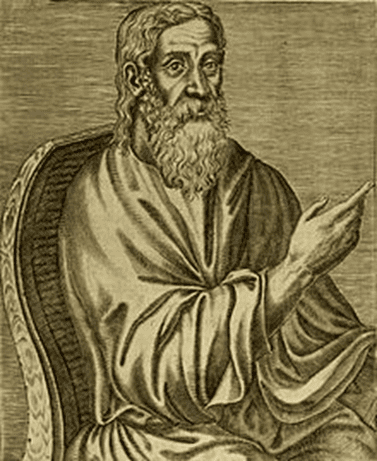 Eusebius quotes Clement of Alexandria (c.150-c.215) [image drawn in 1585] and claims that he (Eusebius) has all his major writings. Regarding Mark’s gospel which Clement included in his Outlines, Eusebius writes: In the same books, Clement has included a tradition of the earliest elders regarding the order of the gospels, namely, that those with genealogies were written first and that Mark originated as follows. When, by the Spirit, Peter had publicly proclaimed the gospel in Rome, his many hearers urged Mark, as one who had followed him for years and remembered what was said, to put it all in writing. This he did and gave copies to all who asked. When Peter learned of it, he neither objected, nor promoted it.
Eusebius quotes Clement of Alexandria (c.150-c.215) [image drawn in 1585] and claims that he (Eusebius) has all his major writings. Regarding Mark’s gospel which Clement included in his Outlines, Eusebius writes: In the same books, Clement has included a tradition of the earliest elders regarding the order of the gospels, namely, that those with genealogies were written first and that Mark originated as follows. When, by the Spirit, Peter had publicly proclaimed the gospel in Rome, his many hearers urged Mark, as one who had followed him for years and remembered what was said, to put it all in writing. This he did and gave copies to all who asked. When Peter learned of it, he neither objected, nor promoted it.
Origen of Alexandria (c. 185 – c. 253), was an early Christian scholar, ascetic, and theologian who was born and spent the first half of his career in Alexandria. He was a prolific writer who wrote roughly 2,000 treatises in multiple branches of theology. Eusebius quotes Origen regarding the origin of Mark’s gospel. In his Commentary on Matthew, he writes,
I learned by tradition that the four gospels alone are unquestionable in the church of God. First to be written was by Matthew, who was once a tax collector but later an apostle of Jesus Christ, who published in Hebrew for Jewish believers. The second was by Mark, who wrote it following Peter’s directives, whom Peter also acknowledged as his son in his epistle: “The church in Babylon greets you …. And so does my son Mark” (1 Peter5:13). The third is by Luke, who wrote the gospel praised by Paul for Gentile believers. After them all came John’s.
Later Christian writers
Peter of Alexandria was the 17th Pope and Patriarch of Alexandria. He wrote in Penance, cannon 9, AD 306.
Peter, the first chosen of the apostles, having been apprehended often and thrown into prison and treated with ignominy, at last was crucified in Rome.
Lactantius, Lucius Caecilius Firmianus signo Lactantius (c. 250 – c. 325) was a Christian author who became an advisor to Roman emperor Constantine I, guiding his Christian religious policy. He wrote in The Deaths of the Persecutors 2:5, AD 318,
When Nero was already reigning, Peter came to Rome, where, in virtue of the performance of certain miracles which he worked . . . he converted many to righteousness and established a firm and steadfast temple to God. When this fact was reported to Nero . . . he sprang to the task of tearing down the heavenly temple and of destroying righteousness. It was he that first persecuted the servants of God. Peter, he fixed to a cross, and Paul he slew.
Note, Nero reigned from AD 54 until his death in AD 68. So, according to Lactantius, both Peter and Paul must have been executed during this period.
Eusebius wrote Church History, also called Ecclesiastical History between AD 312 to 324. In book 2, 25, he wrote:
So it happened that this man [Nero}, the first to announced publicly as a fighter against God, was led on to slaughter the apostles. It is related that in his reign Paul was beheaded in Rome itself and that Peter was also crucified, and the cemeteries there still called by the names of Peter and Paul confirm the record. So does a churchman named Gaius, who lived when Zephyrinius was bishop of Rome.
Cyril of Jerusalem was a theologian of the Early Church. About the end of AD 350, he succeeded Maximus as Bishop of Jerusalem. Cyril left important writings documenting the instruction of catechumens and the order of the Liturgy in his day. He wrote in Catechetical Lectures 6:14-15 about AD 350[4]
And he [Simon Magnus] so deceived the City of Rome that Claudius set up his statue, and wrote beneath it, in the language of the Romans, Simoni Deo Sancto, which being interpreted signifies, To Simon the Holy God.
As the delusion was extending, Peter and Paul, a noble pair, chief rulers of the Church, arrived and set the error right.
Note, Tiberius Claudius Caesar Augustus Germanicus was a Roman emperor, ruling from AD 41 to 54.
The church in Rome
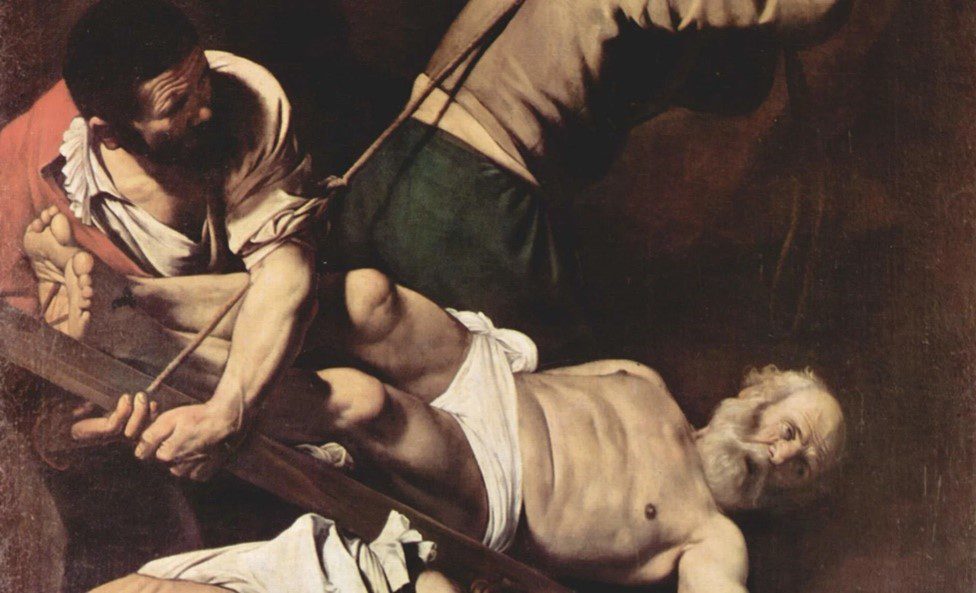 The church in Rome was not started by Peter, but most likely because of Peter’s preaching in Jerusalem at Pentecost where 3,000 people believed and were baptized as recorded in Acts chapter 2. Jews flooded into Jerusalem from all over the world including visitors from Rome (Acts 2:10) for the Passover. Many stayed an extra 50 days for Pentecost and then went back to their homes and the Jews from Rome, most likely started the church there. The image is of Caravaggio Crucifixion of St Peter, which he completed in 1610.
The church in Rome was not started by Peter, but most likely because of Peter’s preaching in Jerusalem at Pentecost where 3,000 people believed and were baptized as recorded in Acts chapter 2. Jews flooded into Jerusalem from all over the world including visitors from Rome (Acts 2:10) for the Passover. Many stayed an extra 50 days for Pentecost and then went back to their homes and the Jews from Rome, most likely started the church there. The image is of Caravaggio Crucifixion of St Peter, which he completed in 1610.
When Paul wrote his great doctrinal letter to the church in Rome, about AD 57, it was established already. And when Paul travelled to Rome while being escorted by soldiers, members of the church came out to meet and greet him (Acts 28:14-15). Paul arrived in Rome in AD 61 when Nero was emperor.
Conclusion
The writings of the early church leave no doubt that Peter spent his final years in Rome and was executed there by the order of Nero. As to whether he became bishop of Rome, the matter is unclear.
[1] https://www.biblicalarchaeology.org/daily/ancient-cultures/ancient-rome/the-apostle-peter-in-rome.
[2] https://www.catholic.com/encyclopedia/Papacy.
[3] Eusebius, Church Histories, book 2, 13-14.
[4] https://www.newadvent.org/fathers/310106.htm.

